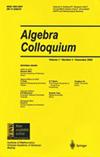交换环的φ - (n, n) -理想
IF 0.4
4区 数学
Q4 MATHEMATICS
引用次数: 0
摘要
设[公式:见文]是一个非零单位元的交换环,且[公式:见文]是一个正整数。本文引入并研究了[公式:见文]-[公式:见文]吸收基本理想的一个新子类,称为[公式:见文]-[公式:见文]-理想。设[公式:见文]是一个函数,其中[公式:见文]表示[公式:见文]的所有理想的集合。如果[公式:见文]和[公式:见文]意味着[公式:见文]与[公式:见文]的[公式:见文]的[公式:见文]与[公式:见文]的[公式:见文]的[公式:见文]的乘积为[公式:见文],则[公式:见文]的适当理想[公式:见文]被称为[公式:见文]-[公式:见文]-理想。除了给出[公式:见文]-[公式:见文]-理想的许多性质外,我们还使用[公式:见文]-[公式:见文]-理想的概念来表征只有有限个最小素数理想的环。本文章由计算机程序翻译,如有差异,请以英文原文为准。
On ϕ - ( n,N ) -ideals of Commutative Rings
Let [Formula: see text] be a commutative ring with nonzero identity and [Formula: see text] be a positive integer. In this paper, we introduce and investigate a new subclass of [Formula: see text]-[Formula: see text]-absorbing primary ideals, which are called [Formula: see text]-[Formula: see text]-ideals. Let [Formula: see text] be a function, where [Formula: see text] denotes the set of all ideals of [Formula: see text]. A proper ideal [Formula: see text] of [Formula: see text] is called a [Formula: see text]-[Formula: see text]-ideal if [Formula: see text] and [Formula: see text] imply that the product of [Formula: see text] with [Formula: see text] of [Formula: see text] is in [Formula: see text] for all [Formula: see text]. In addition to giving many properties of [Formula: see text]-[Formula: see text]-ideals, we also use the concept of [Formula: see text]-[Formula: see text]-ideals to characterize rings that have only finitely many minimal prime ideals.
求助全文
通过发布文献求助,成功后即可免费获取论文全文。
去求助
来源期刊

Algebra Colloquium
数学-数学
CiteScore
0.60
自引率
0.00%
发文量
625
审稿时长
15.6 months
期刊介绍:
Algebra Colloquium is an international mathematical journal founded at the beginning of 1994. It is edited by the Academy of Mathematics & Systems Science, Chinese Academy of Sciences, jointly with Suzhou University, and published quarterly in English in every March, June, September and December. Algebra Colloquium carries original research articles of high level in the field of pure and applied algebra. Papers from related areas which have applications to algebra are also considered for publication. This journal aims to reflect the latest developments in algebra and promote international academic exchanges.
 求助内容:
求助内容: 应助结果提醒方式:
应助结果提醒方式:


